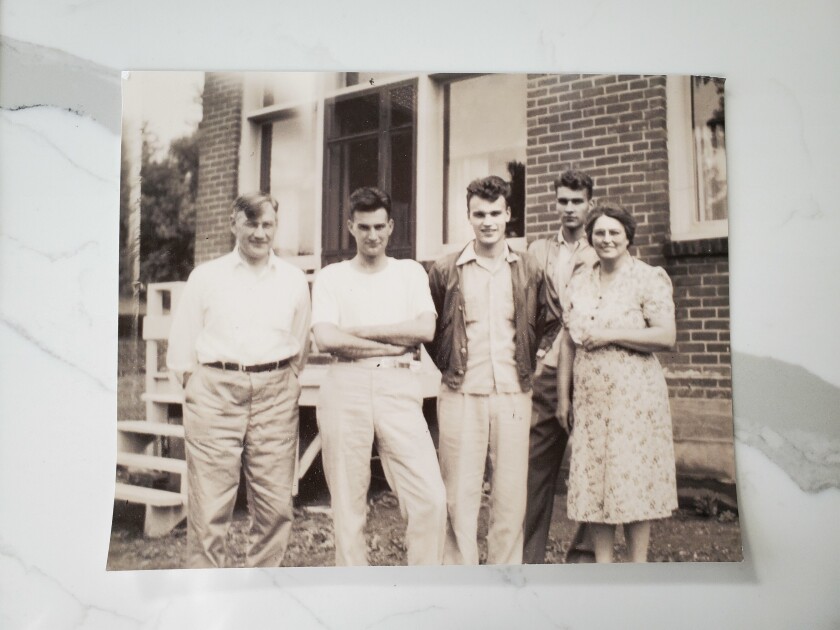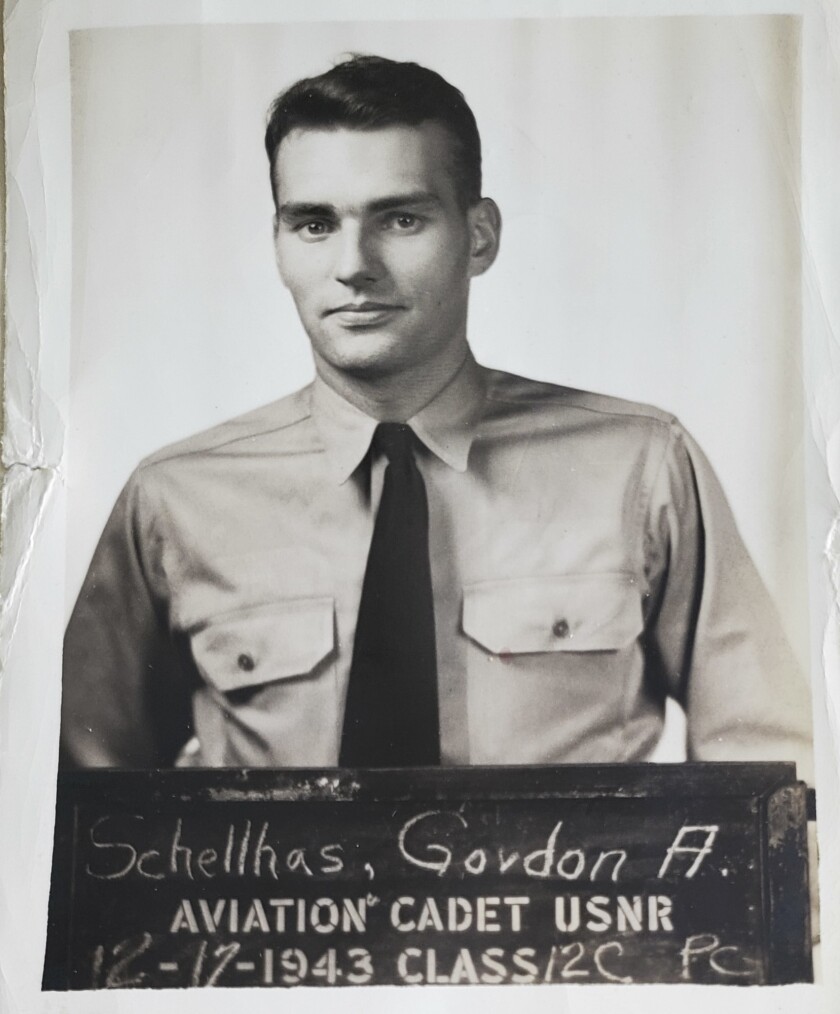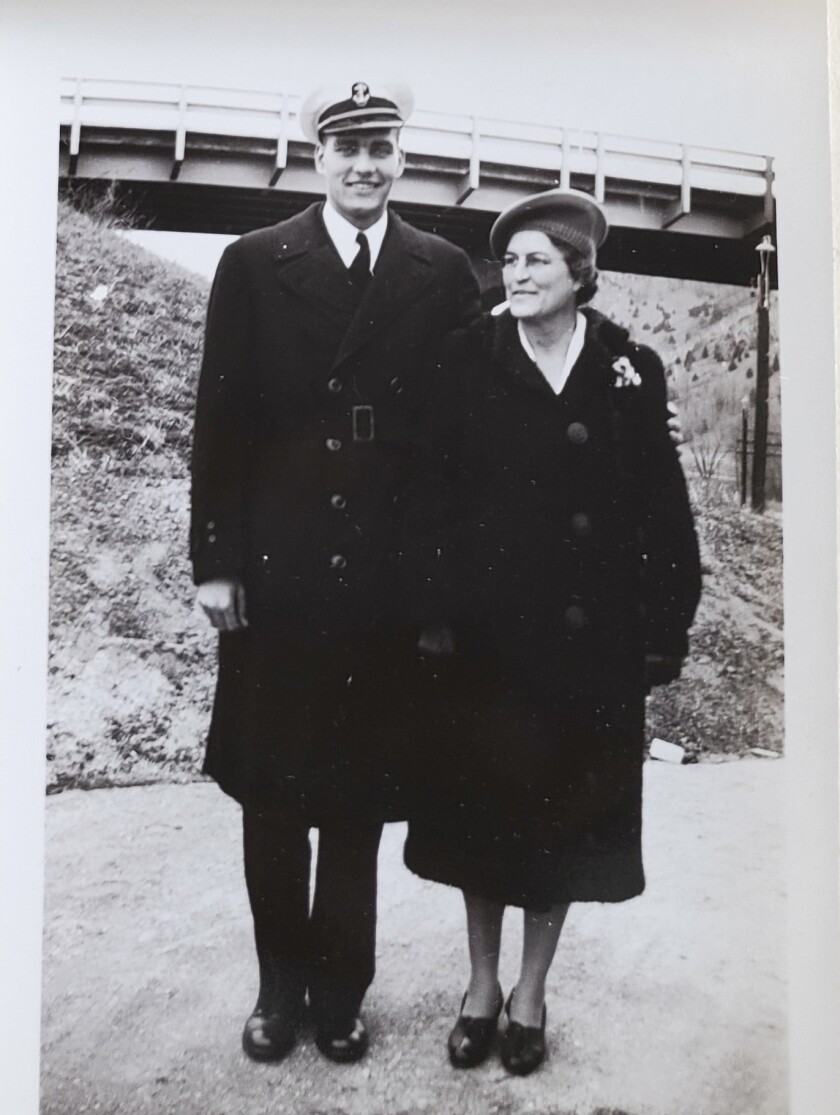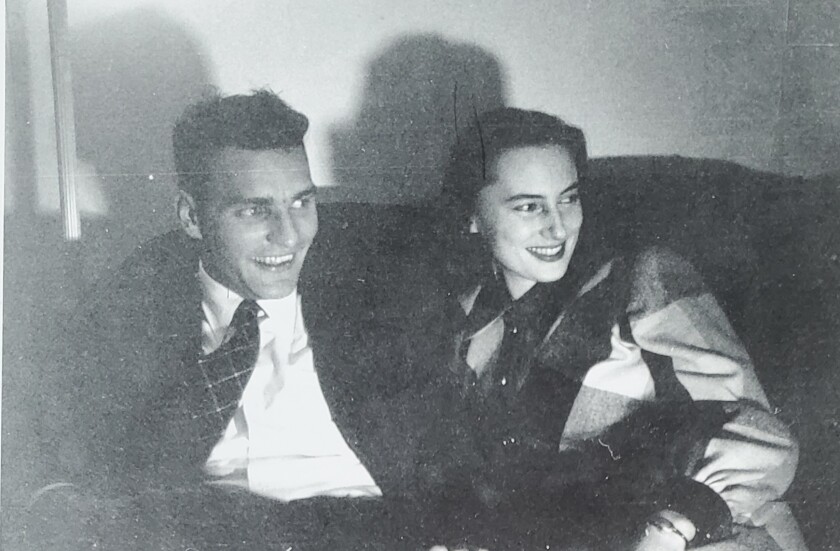WINONA, Minn. — The large framed photo hung in the hallway between the living room and bedrooms of the Kurt and Mabel Schellhas home in Lacrosse, Wis. — high school graduation portraits of their beloved sons.
By all accounts the three Schellhas boys were well-liked — tall and handsome basketball players blessed with movie-star good looks but destined to star in their own real-life family tragedy.
ADVERTISEMENT
Two of them would not live past their 25th birthdays, and the third would live to 96 haunted by being the only surviving Schellhas son.
On Memorial Day every year, we remember those who have died in service to our country. Sadly, some people face a greater burden than others. What happens to a family when they lose more than one soldier to war? How does it affect the parents and surviving children and the trajectory of the entire family?

This is a story about the Schellhas family of Minnesota who faced the unthinkable during World War II, but managed to survive, thrive and now remember years after trying to forget.
'I did not know he had brothers'
Heidi Schellhas remembers the day as if it happened yesterday. She was 4 or 5 years old and staying at her grandparent’s house in Wisconsin when she spotted the photo of three handsome young men amid the dozens of other photos on the hallway wall. She asked her grandmother who they were.
“She said, ‘That's Billy and Buddy.’ And I said, ‘Well, who are they?’ She said, '‘Well, they were your dad's brothers.’” Heidi said. “I did not know he had brothers.”
Heidi’s father was the youngest son — the surviving son — Gordon Schellhas. He died in 2020, at the age of 96 after a life Heidi said had been “racked with grief” over the loss of his two brothers in World War II.
A Winona name
Long before World War II, the Schellhas name was well-known in the community of Winona, Minn., because of the family business, Schellhas Brewing Co. According to a newspaper advertisement from 1893, the brewery’s “Bottle beers are unexcelled for family use.” The brewery closed during Prohibition, but family patriarch Kurt became a master brewer at Fountain City Brewery and later G. Heileman Brewing in LaCrosse.
ADVERTISEMENT
At any normal time in history, it might have come to pass that Kurt and Mabel Schellhas’ three strapping boys would also go into brewing like generations of German Schellhas men before them, but not long after all three graduated from Winona High ��������, World War II would change everyone’s plans.
Bill
Eldest son Bill was attending Winona State Teacher’s College when the Japanese attacked Pearl Harbor on Dec. 7, 1941. Less than a month later, he joined the service and went to training in Texas.

He eventually became a second lieutenant with the U.S. Army Air Forces where he served as a bombardier with the 701st Bomber Squadron, 445th Bomber Group.
In July 1944, Kurt and Mabel were notified that Bill’s plane had been shot down over France and he was missing in action. The family was devastated.
“Parents always say they don't have favorites, but I do think that Bill was probably my grandmother's favorite,” Heidi said.
Bill’s younger brother Kurt (the family called him Buddy) was stationed in Europe just like his brother and wrote of Bill’s MIA status in a diary he kept.
“Worst news of my life came from home. Bill is missing over Europe. He was only in England about a month. No official news about it yet… I hope he’s alive and well.”
ADVERTISEMENT

Summer faded into fall. Then Christmas came and went with no word of Bill. But the situation was about to get even more dire.
“All that time, my grandmother just kept holding out hope that her son was still alive. And while she's grieving about him being missing in action, within six months, Kurt was killed,” Heidi said.
Kurt (Buddy)
In January 1945, just months after covering news of his brother, The Winona Daily News reported, “Kurt Schellhas, Liberator Pilot, Killed in England.”
Like Bill, Kurt was also a second lieutenant with the U.S. Army Air Forces. He was a pilot with the 790th Bomber Squadron, 467th Bomber Group when his plane was shot down.

The father of a fellow crewman, who also died in the crash, wrote a letter to the Schellhas family to tell them what he heard had happened. He wrote that the early morning of Dec. 29, 1944, was foggy when Kurt’s plane took off on its mission.
“It rose to the heights of the trees, two motors cut out and they crashed in the trees, also the bombs exploded. Jim (an airman who witnessed the crash) said when he heard the bombs exploded he knew there was no hopes for the crew. He went to the hospital and they told him they were all dead. They were buried in their winter uniforms side by side and the English people put fresh flowers on their graves every day. Jim said your son was as good a pilot as there was in the A.A.F.”
According to the Winona newspaper report, by this time Bill had also been declared dead.
ADVERTISEMENT
Two sons killed within six months, the unimaginable happening to the Schellhas parents.
“I once asked my dad, ‘How did Grandma keep going?’” Heidi recalled. “I mean, how did she cope with that grief? And he just took a long, deep breath, and said, ‘She just put one foot in front of the other. And soldiered on.’ My grandparents lived through the Prohibition and the Depression and they were just really tough nuts."
But now, they had only one son left.

Gordon
When Gordon got word of his middle brother’s death, he was a naval aviator flying PBYs (patrol bombers) out of Puerto Rico, Cuba and Curacao. Heidi found a photo of her father with his mother very likely taken following the deaths of the older sons.
“My dad is extremely thin in the photo and you can just see the vacant look on his face. I mean, I just think he was sort of shell-shocked,” she said.

The war ended just months later, and while Gordon came home physically unscathed, Heidi said the loss of his brothers was a painful, lifelong wound.
ADVERTISEMENT
“I really think my father was absolutely just racked with grief most of his life. Seriously, I just don't think he healed,” Heidi said.
She recalls Christmases when her father would experience excruciating pain just before they were ready to sit down for dinner.
“You could tell he was just grimacing. You could tell that he was just clenching his teeth. He was just in pain and he wouldn't open his mouth and I'd say to my mom, ‘What is wrong with Dad?’ And she said, ‘Oh, he gets these pains. I think because he just remembers.’”
While the pains might have been a physical manifestation of Gordon’s grief, Heidi said her dad didn’t talk much about his brothers. As a dad he was firm, but affectionate, loving with a great sense of humor.
After the war, he worked briefly for his father, then a brewmaster at G. Heileman Brewing. He married his wife Jean Morcomb and eventually earned a bachelor’s degree in chemistry from the University of Wisconsin.

He worked for Paul Lewis Laboratories in Milwaukee and later, Heidi said, perhaps because of his famous last name, he was recruited by Rahr Malting Co. where he worked for 35 or 40 years as a malt salesman.
He and Jean were the first to encourage and nudge their three children toward high-achieving careers. Eldest child Kurt became a diagnostic radiologist; Heidi, the middle child, became a judge, including an appointment to the Minnesota Court of Appeals in October 2007; and Gretchen, the youngest, is a practicing attorney and partner at a law firm in Minneapolis.
ADVERTISEMENT

Gordon’s 96 years were full, almost as if he were trying to live a life worthy of three men.
“I really think my mother was the one who forced him to enjoy life. Which had to be hard for her. My dad loved life. They were active in the American Legion in Nisswa, Minn. My dad loved our country, and he was a patriot,” Heidi said.
Even so, Heidi said he shied away from talking about the war and never visited his brother’s graves in Europe, something Heidi and other family members have done.
It was only in his later years that he started talking about Bill and Kurt, even cherishing photos Heidi had taken of her uncle’s grave in Europe.
“I think he finally started to have some peace about everything. And felt that maybe his brothers wouldn't be forgotten.”

In fact, according to the family, in Gordon’s final days, he wondered aloud about whether he would see his brothers again. In his 2020 obituary, they shared an entry from Kurt’s diary from Oct. 31, 1943, when Kurt happened to run into little brother Gordon while both were in Oklahoma City. They shared a hotel room, laughed and stayed up all night talking. Then it was time to go.
Kurt wrote:
“When I said goodbye to Gordon, I almost cried. We shook hands and I climbed on the bus. As I sit here writing, I still have a lump in my throat because it will probably be quite a while before I see him again. "
That was the last time Kurt and Gordon would see each other.
Parents Kurt and Mabel lived another 40 years after the deaths of their first two boys, both living into their mid-80s. Gordon lived another 75 years.
All that remains from that painful chapter in the family's life are old letters, diary entries and photos — all of which we can hope will help future generations remember not just the pain and sacrifice, but the heroism and love of three brothers from Winona.









